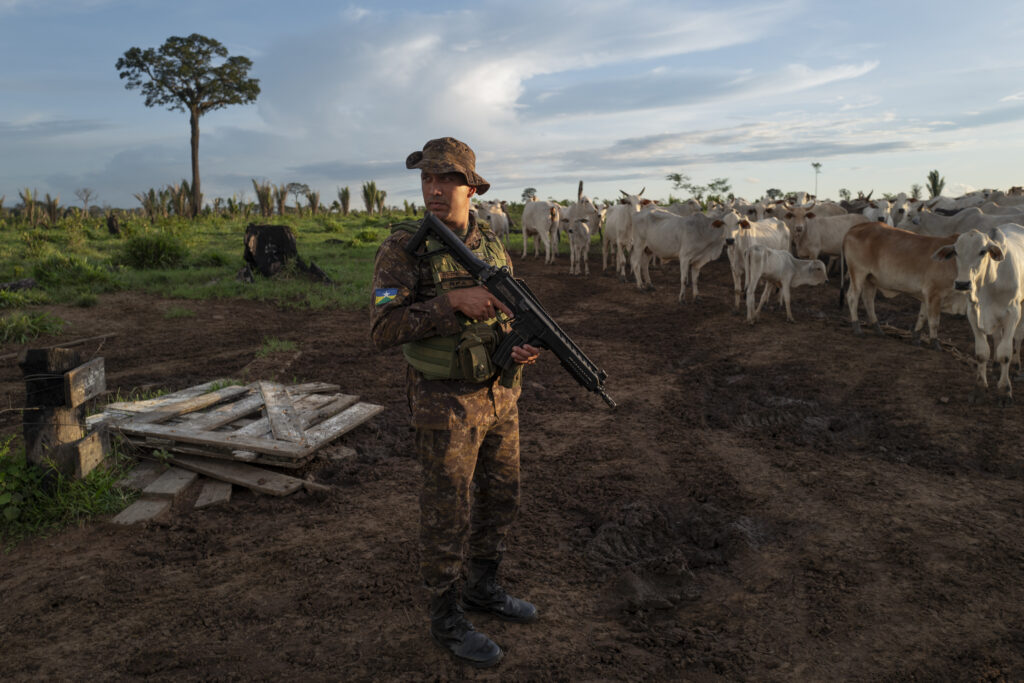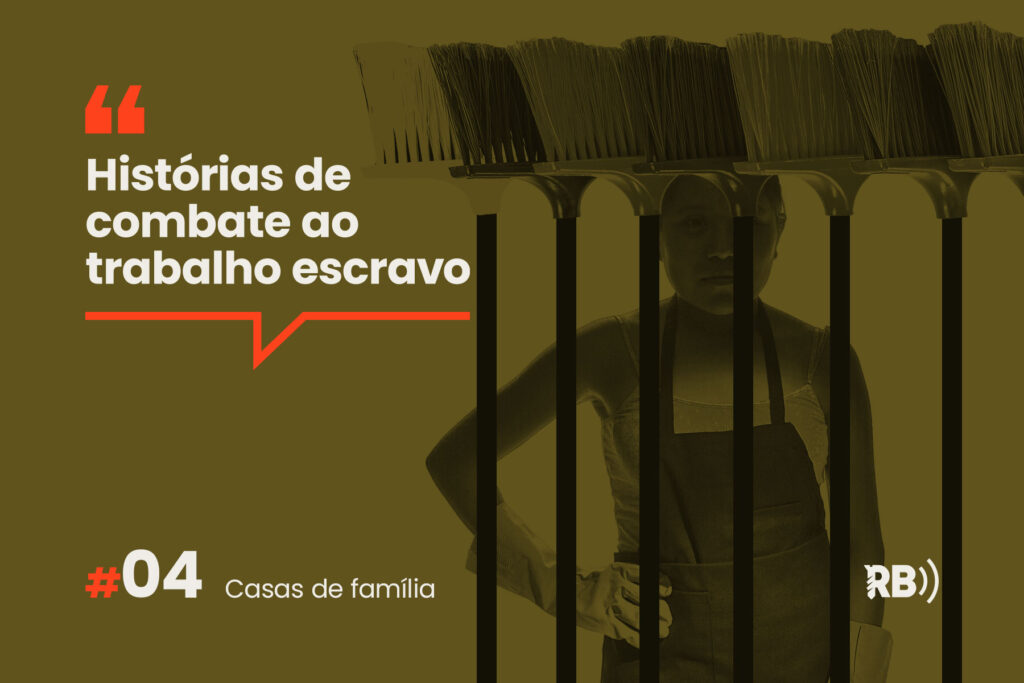AFTER AN INVESTIGATION by the Prosecutor’s Office of Rondônia, in Brazil, two invaders of the Guajará-Mirim state park were arrested and obtained rural credit from Banco do Brasil (BB) and Banco da Amazônia (Basa), according to Central Bank data obtained by Greenpeace and accessed by Repórter Brasil.
One of the beneficiaries was former judge Hedy Carlos Soares. Between June and August 2021, he obtained four rural credit grants from Basa for cattle breeding and the acquisition of animals on his Prosperidade farm in the municipality of Buritis, in the state of Rondônia.
With a total area of 946 hectares, the Prosperidade farm had 130 hectares deforested between 2012 and 2021, according to Greenpeace analysis based on satellite data from Prodes, a monitoring program by Inpe (National Institute for Space Research). A year later, the former judge obtained another rural credit issuance for the same property, totaling more than 332,000 USD.
The last credit was issued on August 1, 2022. Fifteen days later, Soares was arrested by order of the Rondônia Court of Justice for having handed down rulings that favored him. One of them legitimized the ownership of the Cantão farm, which is part of the Guajará-Mirim park and of which the judge was a tenant.
The judge moved at least 300 head of cattle between the Cantão and Prosperidade farms, according to documents called Animal Transit Guides (GTAs). The documents are mentioned in the Public Prosecutor’s investigations.
In May, Repórter Brasil had already revealed that individuals identified as fronts for the judge supplied cattle for years to JBS and Marfrig, who admitted the relationship with the suppliers and reported that they were blocked.

Another farm, Recanto, located just 400 meters from the Cantão property in Nova Mamoré (Rondônia), received 45,000 USD from Banco do Brasil in January 2020 for the acquisition and maintenance of animals. Its owner, Walvernags Cotrin Gonçalves, was arrested last November for invading the Guajará-Mirim park. According to the Prosecutor’s Office investigations, he was part of the same group as the former judge.
At the time that the property received the credit, it had less than 4% of its area with native vegetation. Of the 419.05 hectares of the Recanto farm, 402 hectares were deforested between 2013 and 2015, according to Prodes/Inpe satellite data analyzed by Greenpeace. This is equivalent to 95.9% of the property.
:: Read more: Land grabbing case in Brazil links meatpackers to corruption and money launder
Even if it has been authorized to cut down vegetation, the property is irregular because it does not respect the minimum conservation areas on rural properties set out in the Brazilian Forest Code. Federal law states that rural properties must maintain a portion of native vegetation called the Legal Reserve. In the Amazon, the Legal Reserve must correspond to 80% of the property in forest areas. The rule also establishes that Permanent Preservation Areas on river banks and hilltops must be maintained.
Asked by Repórter Brasil, Sedam, Rondônia’s state environmental development secretariat, did not answer whether the Prosperidade and Recanto farms had received authorization from the agency to clear vegetation, the so-called authorization for vegetation suppression (ASV).
How banks restrict credit to offenders
The responsibility of financial institutions has been regulated by Central Bank norms since 2008 to restrict rural credit to environmental offenders. The accountability of the cattle supply chain in the Amazon for suppliers linked to environmental crimes relies only on the guidelines of the “Boi na Linha” protocol, an initiative by Imaflora (Institute for Forest and Agricultural Management and Certification) in partnership with the Federal Prosecutor’s Office.
Central Bank resolutions were updated in 2023 with stricter rules, banning credit to properties with embargoed areas, suspended Rural Environmental Registry (CAR), or overlapping with conservation units, indigenous lands, and public forests across the country.
Even so, according to Greenpeace analysis, the current norms are insufficient to prevent credit concessions to deforesters. In the report “Bankrolling Extinction,” published last April, the NGO revealed that 10,074 properties, wholly or partially within conservation units in the Amazon, were benefited by rural credit resources between 2018 and 2022.
Also receiving financing were 24 properties overlapping 7 Indigenous lands, 21,692 properties overlapping non-designated public forests; 798 properties financed with an Ibama embargo, and 29,502 properties with deforestation.
The research was carried out by cross-referencing public databases such as the Central Bank’s Rural Credit Operations System (Sicor), the Rural Environmental Registry (CAR), and deforestation data from Prodes/Inpe. The properties of Hedy Carlos Soares and Walvernags Cotrin Gonçalves are among the cases investigated by Greenpeace.
“The banks claim they granted the credits before the Central Bank’s most recent rule, from 2023, came into force. But we have laws, like environmental crimes, and they are sovereign. How can the banks ignore the legislation?” asks Thais Bannwart, spokesperson for Greenpeace
Enhanced Credit Granting Norms
Following Greenpeace’s report, the Federal Prosecutor’s Office issued a recommendation in early June for banks to cancel rural credit for properties in conservation areas in the Amazon. The institutions have 30 days to respond.
In its report, Greenpeace suggests new credit-granting criteria to close the loopholes identified by the research. According to the NGO, these could be addressed with measures such as requiring authorization for vegetation suppression (ASV) and cattle traceability, which would prevent rural credit from being used to acquire animals linked to deforestation.
Another suggestion from the NGO shifts the focus of scrutiny: the veto on resources would target the owner with embargoes or fines on any of their properties, not just the property registered for the credit operation, as the current criterion mandates.
The changes would close the loopholes that allowed the granting of credits to Hedy Carlos Soares and Walvernags Cotrin Gonçalves. The lawyers for both were contacted by Repórter Brasil but did not respond.
“Cases like that of Walvernags Cotrin Gonçalves, who received financing from Banco do Brasil for a farm with 96% of the area deforested, illustrate that even the first norm of the National Monetary Council that made environmental requirements for rural credit for the Amazon biome – resolution CMN 3545/2008 – is not being complied with,” evaluates sustainable finance specialist Luciane Moessa, director of the Association for Inclusive Sustainable Solutions and former prosecutor of the Central Bank.
Banco do Brasil is the largest operator of rural credit in the Legal Amazon, according to Greenpeace. In 2022 alone, the institution granted 44.10% of the value of rural credit contracts in the region. BB ranked 8th among ten major banks evaluated in Rasa (Social and Environmental Performance Ranking of financial institutions), developed by the Association for Inclusive Sustainable Solutions.
Banco da Amazônia was evaluated by Rasa in the ranking of development banks and funding agencies and ranked 2nd, behind only Brazil’s National Bank for Economic and Social Development (BNDES).
When questioned about the granting of credit to invaders of the Guajará-Mirim park, both banks reaffirmed their policies through statements. Still, they did not mention the cases presented by Repórter Brasil.
“The BB does not comment on specific cases out of respect for banking secrecy,” states the Banco do Brasil note, adding that the bank “is confident about the compliance of its credit-granting processes.”
Banco da Amazônia stated that it is constantly improving its criteria for evaluating socio-environmental and climatic risks. “Currently, these criteria include automatic verification of overlap with indigenous areas, quilombola territories, public reserves, conservation units, and embargoes,” says the bank’s note.
Leia também

